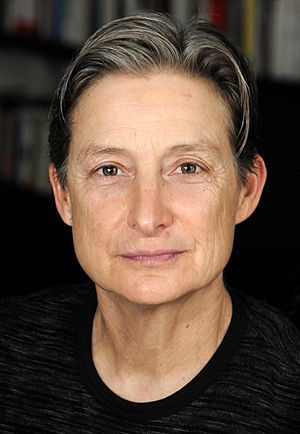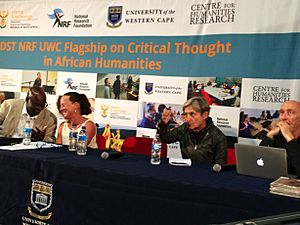Judith Butler facts for kids
Quick facts for kids
Judith Butler
|
|
|---|---|

Butler in March 2012
|
|
| Born |
Judith Pamela Butler
February 24, 1956 Cleveland, Ohio, U.S.
|
| Education |
|
| Partner(s) | Wendy Brown |
| Era | 20th-/21st-century philosophy |
| Region | Western philosophy |
| School |
|
| Institutions | University of California, Berkeley The European Graduate School |
| Doctoral advisor | Maurice Natanson |
|
Main interests
|
|
|
Notable ideas
|
|
Judith Pamela Butler (born February 24, 1956) is an American philosopher and scholar. Their work has greatly influenced ideas about gender, politics, and how we understand ourselves.
Butler is a professor at the University of California, Berkeley. They are known for their books Gender Trouble (1990) and Bodies That Matter (1993). In these books, they explore how society shapes our ideas of gender. Their ideas have been very important in the fields of feminism and queer theory. Butler also speaks out on important political issues, including LGBT rights.
Contents
Early Life and Education
Judith Butler was born in Cleveland, Ohio, on February 24, 1956. Their family had Jewish roots from Hungary and Russia. As a child, Butler went to Hebrew school and special classes on Jewish ethics. They said these ethics classes were their "first training in philosophy."
When they were 14, Butler's rabbi started these special classes as a "punishment" because Butler was "too talkative." But Butler loved the idea! They wanted to study big questions like why a philosopher named Spinoza was removed from his religious community. They also wondered if German idealism (a type of philosophy) had any link to Nazism.
Butler went to Bennington College and then Yale University. They earned their Bachelor's degree in 1978 and their PhD in 1984 from Yale. They also spent a year studying at Heidelberg University in Germany. Before joining the University of California, Berkeley in 1993, Butler taught at other universities.
Key Ideas and Books
Judith Butler has written many important books. These books explore how language and society shape our lives and identities.
Understanding Excitable Speech (1997)
In Excitable Speech, Butler looks at the topic of hate speech and whether it should be censored. They explain that deciding to censor speech is complicated. Sometimes it might be helpful, but other times it could be worse than allowing the speech.
Butler suggests that hate speech only becomes "hate speech" after authorities say it is. This means the government has the power to decide what is acceptable to say. They also argue that trying to stop certain words can actually make those words more powerful.
Exploring Precarious Life (2004)
Precarious Life is a book where Butler discusses how fragile human life can be. They talk about vulnerability, grief, and violence, especially after events like the War on Terrorism. Butler looks at how people held in places like Guantanamo Bay detention camp are treated. They argue that international laws sometimes only protect people who belong to a recognized country. This leaves people who are stateless or labeled "terrorists" without protection.
Butler also writes that all humans depend on each other. We are never truly alone or completely independent. Experiences like grief (feeling sad after a loss) show how connected we are. They believe that recognizing our shared human vulnerability can help us understand each other better. However, not all lives are seen as equally important. This can stop people from mourning certain losses, which means some people are not recognized as fully human.
Insights from Giving an Account of Oneself (2005)
In Giving an Account of Oneself, Butler explores how much we truly know about ourselves. They suggest that we can never fully understand why we do everything we do. This is because our identity is shaped by society and other people in ways we can't always control.
Butler argues that our ability to be responsible for our actions is limited by how much we know about ourselves. If we demand that someone be fully transparent about themselves, it ignores the parts of us that are hidden. Butler believes that being ethical means understanding these limits. It means recognizing that we can't always give a complete explanation of ourselves. This idea encourages us to think critically about the world that shapes us.
The Power of The Force of Nonviolence (2020)
In The Force of Nonviolence, Butler connects the idea of nonviolence with the fight for social equality. They explain that nonviolence is often seen as a quiet, personal choice. But Butler argues that nonviolence is a strong ethical stance that happens right in the middle of political action.
Political Involvement
Butler has been very active in political movements. Much of their early work focused on LGBTQ+ and feminist issues. They have supported gay marriage and spoken out against wars.
Butler has also been involved with the Occupy movement. They have publicly supported the Boycott, Divestment and Sanctions (BDS) campaign against Israel. Butler believes that Israel does not represent all Jewish people or their opinions. They have criticized some actions of modern Israel and some forms of Zionism.
In 2011, Butler spoke at an Occupy Wall Street protest. People were asking what the protesters' demands were. Butler said:
People have asked, so what are the demands? What are the demands all of these people are making? Either they say there are no demands and that leaves your critics confused, or they say that the demands for social equality and economic justice are impossible demands. And the impossible demands, they say, are just not practical. If hope is an impossible demand, then we demand the impossible – that the right to shelter, food and employment are impossible demands, then we demand the impossible. If it is impossible to demand that those who profit from the recession redistribute their wealth and cease their greed, then yes, we demand the impossible.

Butler is a member of groups like Faculty for Israeli-Palestinian Peace and Jewish Voice for Peace. In U.S. politics, they supported Hillary Clinton in the 2016 election.
Adorno Prize Discussion
In 2012, Butler received the Theodor W. Adorno Award. Some people, including officials from Israel and Jewish organizations in Germany, criticized this choice. They were upset because of Butler's comments about Israel and their support for a boycott against Israel.
Butler responded that these criticisms were aimed at anyone who speaks critically about Israel's policies. They wrote that their strong ethical views come from Jewish philosophy. Butler also said it was "blatantly untrue" to say that criticizing Israel means someone is anti-Semitic.
Views on Hamas and Hezbollah
Butler has faced criticism for comments about Hamas and Hezbollah. In 2012, they were accused of calling these groups "social movements that are progressive." Butler explained that their comments were taken out of context. They said they were simply describing how these groups see themselves as anti-imperialist. Butler added that, like with any group, people need to decide if they support them and critically evaluate their actions.
After the 2023 Israel–Hamas war began, Butler wrote an essay. They condemned the "terrifying and revolting massacre" by Hamas. However, they also argued that the attacks should be understood in the context of the "horrors of the last seventy years." This essay was criticized by some German newspapers.
In March 2024, Butler stated that the October 7, 2023, attack was an "act of armed resistance" rather than a "terrorist attack" or "antisemitic attack." They said it was "an attack against Israelis."
Personal Life
Butler identifies as a woman who loves women. As of 2020, they said they use both they/them and she/her pronouns, but prefer they/them. Butler has shared that they were "never at home" with being assigned female at birth.
They live in Berkeley, California, with their partner Wendy Brown and their son.
Awards and Recognition
Butler has received many honors for their work:
- 1999: Guggenheim Fellowship
- 2007: Elected to the American Philosophical Society
- 2008: Mellon Award for contributions to humanities
- 2012: Theodor W. Adorno Award
- 2013: Honorary Doctorate from University of St. Andrews
- 2013: Honorary Doctorate from McGill University
- 2014: Honorary Doctorate from University of Fribourg
- 2015: Elected as a Corresponding Fellow of the British Academy
- 2018: Honorary Doctorate from University of Belgrade
- 2019: Elected as Fellow to the American Academy of Arts and Sciences
Images for kids
See also
 In Spanish: Judith Butler para niños
In Spanish: Judith Butler para niños
 | Jewel Prestage |
 | Ella Baker |
 | Fannie Lou Hamer |


